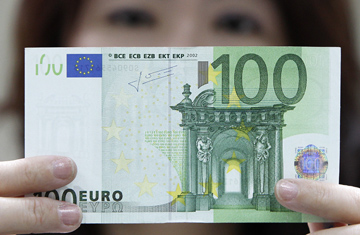
An employee checks a euro note at the Bank of Taiwan head office in Taipei on May 10, 2010
It was a weekend rich in symbolism. Sunday, May 9, was Europe Day, the 60th anniversary of the moment when France, Germany and the other war-shattered European states declared they would pool their resources in a supranational community. The message — from crisis comes opportunity — was not lost on today's generation of European leaders. With Greece seemingly on the brink of insolvency and markets pounding other vulnerable euro members like Portugal and Spain, the continued viability of the single currency — the European Union's most emblematic project — is under threat. So in the early hours of Monday morning, after weeks of indecision, Europe's leaders met the challenge by setting up a colossal €750 billion ($950 billion) crisis fund.
The tone was set in the early hours of Saturday morning, after euro-zone leaders gathered in Brussels to quell any talk of contagion from Greece. "We will not let others undo what generations have created," said French President Nicolas Sarkozy as he vowed to "fight speculators" and beat back their "attack on the whole euro zone." German Chancellor Angela Merkel said the mechanism would send a "very clear signal" to markets to back off.
On Sunday evening, Finance Ministers of all 27 E.U. member states met for 11 hours to settle the details. The plan's highlight was a centralized bailout pot: a loan mechanism for the euro zone's weaker economies in the event of another market panic.
The three-year aid plan includes €59 billion ($76 billion) under an existing lending program, plus €435 billion ($560 billion) in bilateral loan guarantees from the euro-zone countries. The International Monetary Fund (IMF) will provide additional loan guarantees of at least half of the E.U.'s total contribution, or €250 billion ($321 billion). In all, the gargantuan package represents 8.2% of the euro area's GDP. "It proves that we shall defend the euro, whatever it takes," said E.U. Economic and Monetary Affairs commissioner Olli Rehn.
The deal, announced as Asian stock markets opened, was greeted emphatically. The euro, which last week sank to a 14-month low against the dollar, rose nearly 2% in early trading in Asia. "This could be a potential turning point in the crisis management," said Jacques Cailloux, chief euro-area economist at the Royal Bank of Scotland in London, in an e-mail to TIME. "Policymakers received the markets' wake-up calls of the last few days."
But the E.U.'s response does not stop there. The package foresees other longer-term measures, like tighter budget rules, sharper monitoring and more effective sanctions for breaking debt and deficit guidelines. It reflects a widespread recognition that E.U. institutions failed to properly scrutinize countries like Greece that fiddled their official budget statistics years ago in order to meet the euro entry criteria. At the same time, the European Central Bank (ECB) has said it is ready to buy government and private debt "to ensure depth and liquidity in those market segments which are dysfunctional."
That's not all. On May 12, the European Commission is set to unveil proposals to toughen supervision of the euro zone's public finances. And France has repeated its calls for the euro zone to equip itself with an economic government to match the ECB.
It will take more than tough talk, though, to fix the euro. The euro zone already has penalties for countries that flout debt and deficit rules. But the measures, known as the Stability and Growth Pact, lost credibility early on when they failed to punish Germany and France for persistently breaching its rules. And while Sarkozy and Merkel have recently raised their rhetoric about tighter fiscal discipline, they have shown little inclination toward helping Brussels in its policing of their own national budgets.
More broadly, the euro zone still needs to resolve structural problems that go beyond debt in countries like Greece, Portugal and Spain. The crisis has exposed chasms among the different euro-zone economies, not only in government debt but also in private debt, trade balances, employment, wages and overall growth. It has already prompted dire warnings from Paul Krugman and Joseph Stiglitz, two American economic grandees and Nobel laureates who both say that without reform, the euro zone could collapse.
And euro-zone leaders also need to come to terms with the markets that have so ruthlessly unsettled them in recent days. They have consistently raged against speculators (as distinct from investors), routinely dismissing them as irrational. On Sunday, Swedish Finance Minister Anders Borg described investors as "wolf packs," adding, "If we will not stop these packs, they will tear the weaker countries apart."
According to UniCredit Group chief economist Marco Annunziata, comments like that are self-serving and dangerously counterproductive. Europe's leaders should be tackling the euro's very real weaknesses, he says, instead of pretending they exist only in the imaginations of the speculators. "Demonizing markets, implicitly casting investors as heartless speculators against the tragic background of the Greek riots, is outright irresponsible," he says.
It may be too soon to pronounce this weekend's decisions a success. Over the past few months, the E.U. has made many showy declarations of its resolve to face down threats to the euro, only to find markets blithely ignoring them. But at least the E.U. is moving faster. "One of the lessons of the recent financial crisis is that the reaction speed is crucial," says Anton Brender, director of economic studies for Dexia Asset Management. "You have to be able to interact with markets in real time." If history is any guide, a firm response to a crisis can ensure that Europe shapes events, rather than the other way around.
